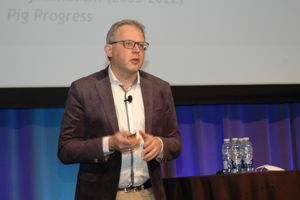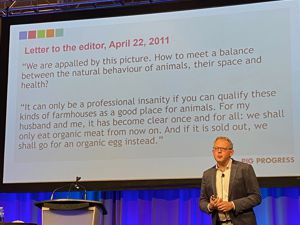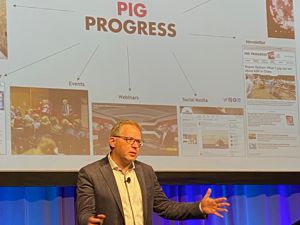Views from an agricultural immigrant
Date posted: January 14, 2022
He's a young man who came into the pig world as an outsider, what he calls an "immigrant," and has used his natural curiosity, journalism skills and entrepreneurial spirit to build a large global following on stories related to the pig industry.
It's called Pig Progress and an energetic Vincent ter Beek closed off the 2022 Banff Pork Seminar with an interesting personal story and a fresh and heartening look at industry issues.
His first connection with agriculture was as a young journalist when ter Beek was sent by his publication to cover a technical conference on animal health. He soon realized he was swimming in technical data and over his head in complexity. He listened to presentation after presentation, wondering how he was going to write something useful for his editor.
Then it happened. One presenter was so clear, so understandable that ter Beek was able to write a strong article from it. That formed the basis of his approach for journalism and ultimately Pig Progress. That was to be prepared to use curiosity and lack of knowledge to look at the pig world in a fresh way and to be prepared to wade through a lot of material to find the story that presents itself.
Today he and his group at Pig Progress operate in many communications formats on many platforms. Their energetic and productive company looks at the pork industry globally and they have never lost the natural story telling interest that comes from looking at that world from the point of view of a young journalist and an industry immigrant, fascinated by stories waiting to be told.
More than anything he is never afraid to question, never held back by industry expectations. And that presenter who did the nice job with his material in that meeting years ago is one of the writers on ter Beek's service.
One key message that ter Beek shared with BPS delegates that is driving his interest and Pig Progress is the gap between urban and farmers.
"Who is responsible?" he asked delegates. "Urban or farmers, or both?"
A love of history has shaped the conclusion ter Beek has come to on that front. He shared his examples from global travels with pork operations of all kinds, showing why pork production has evolved and what that means for how society thinks about it.
There are clearly good reasons for why pork production has taken steps in production techniques, he says, but if we want to look to the future while most pig farmers may believe they are doing an honest job, it will ultimately be the urban population that shapes the pork industry of the future.
He used examples of the sound production rationale for things such as production crates, castration or tail docking. Then he used examples of how that information may be shared in an educational sense on Instagram.
"Do you think that would generate a reaction?" he asked delegates, showing a photo of pig castration and sows stalls.
Of course it would, was the answer. The industry has to be transparent but realistic.
In 2050 there will be 9.2 billion people on the planet, says ter Beek. Where will they live? In cities. Pork will likely be a luxury product, but in the end this approach will be one that gives the industry the license to operate.
So ter Beek's send home message was that the pig industry should not forget its own complexity. Always ask yourself if better solutions are available: No castration, no tail docking, "iron" free pig houses.
"A richer world will demand more from its pig production," he says. "The world will become more Instagramable. And the industry should always imagine there may be a young journalist in the room."
Pig Progress information is available at www.pigprogress.net and on social media. BPS 2022 delegates can review ter Beek's presentation on the BPS app.



